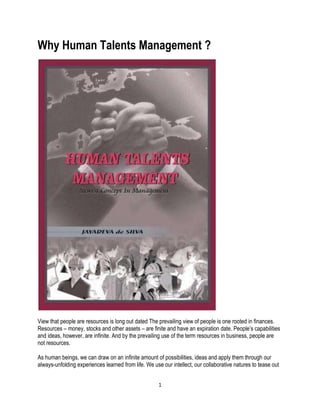Why Humnatalents management ?
•Descargar como DOCX, PDF•
0 recomendaciones•517 vistas
Denunciar
Compartir
Denunciar
Compartir

Recomendados
Entrepreneurship development

Entrepreneurship developmentCenter for Innovation Entrepreneurship & Leadership, Institut Teknologi Bandung
Más contenido relacionado
Similar a Why Humnatalents management ?
Similar a Why Humnatalents management ? (20)
Left Brain, Right Brain, Flexibility, Business Excellence

Left Brain, Right Brain, Flexibility, Business Excellence
1 defining the human capital leader of tomorrow.doc

1 defining the human capital leader of tomorrow.doc
Más de Jayadeva de Silva
Más de Jayadeva de Silva (20)
Buddhist approach to decision making and Counselling

Buddhist approach to decision making and Counselling
Lord buddha on anger management by jayadeva de silva

Lord buddha on anger management by jayadeva de silva
Lord buddha on teaching and learning article by jayadeva de silva

Lord buddha on teaching and learning article by jayadeva de silva
Psychology for diversity management and diversity training

Psychology for diversity management and diversity training
Management seminar series- National chamber of commerce

Management seminar series- National chamber of commerce
Why Humnatalents management ?
- 1. 1 Why Human Talents Management ? View that people are resources is long out dated The prevailing view of people is one rooted in finances. Resources – money, stocks and other assets – are finite and have an expiration date. People’s capabilities and ideas, however, are infinite. And by the prevailing use of the term resources in business, people are not resources. As human beings, we can draw on an infinite amount of possibilities, ideas and apply them through our always-unfolding experiences learned from life. We use our intellect, our collaborative natures to tease out
- 2. 2 nuances in new business ideas or revolutionize markets through a new product offering. It is silly to say this, but necessary for the point, but money, stocks or other finite assets cannot revolutionize markets. People revolutionize markets. Assets are merely a means to such an end. Money without people is useless. The viewpoint that believes people are a means to an end has run its course. We are seeing employees refusing to play by the tired rules from the previous century. They are leaving jobs to start their own work. They are leaving companies that treat them as a finite asset in hopes of finding someplace where they are valued. Sure CEOs and their counterparts are slow to acknowledge this. Too many are chasing finite resources for short-term gain. We will, however, see alarmed faces and panicked actions from decision makers when they cannot get the talent they want because of arcane policies that treat people as finite resources. The organizations who want to tap into the infinite possibilities that exist between each of our two ears will find a more willing collaborator in employees. The nuance in such a change is that a relationship exists between manager and employee unlike what is familiar and broken today: boss tells employee what to do; employee complies. Or worse, employee shares ideas and manager takes credit or smothers ideas. People are not resources. People are who turn resources into more resources. It is people who transform markets or turn businesses into sensations. People are not a means to an end. That is merely short-termed thinking that has soured capitalism, poisoned too many corporate cultures, and lured decision-makers into abandoning their humanity and ethics for the promise of riches. My book titled “Humantalents Management was published in the year 2000,which suggested the replacement of the term human resource management with “human talents management
